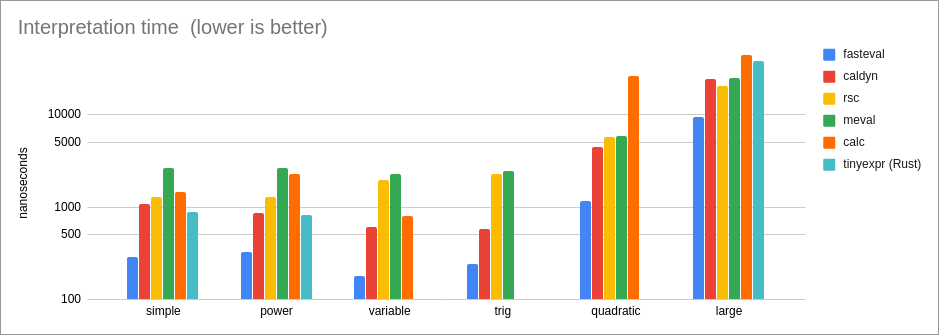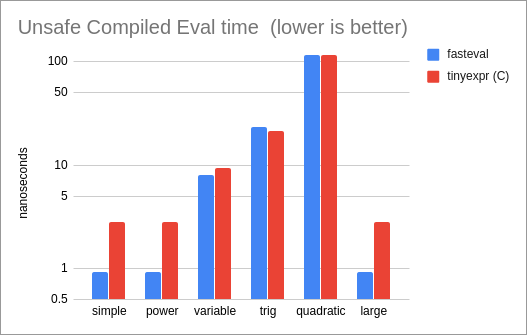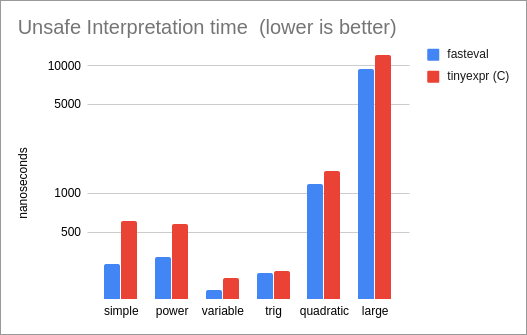
Fast evaluation of algebraic expressions
fasteval is a library for parsing, compiling, and evaluating algebraic expressions.
It can be used directly as a calculator language (much like python), and it is
an excellent foundation for building higher-level-languages.
Documentation:
Add this to your Cargo.toml:
[dependencies]
fasteval = "0.2.0"
You should always build with RUSTFLAGS="--emit=asm" because it greatly improves LLVM's compile-time optimizations.
If you are using a 'nightly' Rust compiler, you can build with --features nightly to enable optimizations that aren't yet available in Rust 'stable'.
You can build with --no-default-features to disable alphabetical keywords like and, or, NaN, inf. (These words might be important to your applications.)
You can build with --features unsafe-vars to enable Unsafe Variables.
fasteval is a good base for building higher-level languages.Here is one simple example. See the API Reference for many more!
The ez_eval() function performs the entire allocation-parse-eval process
for you. It is slightly inefficient because it always allocates a
fresh Slab, but it is very simple to use:
```rust fn main() -> Result<(), fasteval::Error> { // This example doesn't use any variables, so just use an EmptyNamespace: let mut ns = fasteval::EmptyNamespace;
let val = fasteval::ez_eval(
"1+2*3/4^5%6 + log(100K) + log(e(),100) + [3*(3-3)/3] + (2<3) && 1.23", &mut ns)?;
// | | | | | | | |
// | | | | | | | boolean logic with short-circuit support
// | | | | | | comparisons
// | | | | | square-brackets act like parenthesis
// | | | | built-in constants: e(), pi()
// | | | 'log' can take an optional first 'base' argument, defaults to 10
// | | numeric literal with suffix: n, µ, m, K, M, G, T
// | many built-in functions: print, int, ceil, floor, abs, sign, log, round, min, max, sin, asin, ...
// standard binary operators
assert_eq!(val, 1.23);
Ok(())
} ```
``text
github.com/fasteval$ rlwrap cargo run --release --example repl
Finished release [optimized] target(s) in 0.01s
Runningtarget/release/examples/repl`
print("Hello fasteval", 1, 2, 3) Hello fasteval 1 2 3 3 _ + 1 4 _ + 1 5 _ * 2 10 _ ^ 0.5 3.1622776601683795 let a = 1 1 let b = a + 1 2 let c = a + b * 3 7 a + b + c 10 push Entered scope[1] let b = b + 10 12 a + b + c 20 pop Exited scope[1] a + b + c 10 1+23/4^5%6 + log(100K) + log(e(),100) + [3(3-3)/3] + (2<3) && 1.23 1.23 1+23/4^5%6 + print("log(100K) =",log(100K)) + log(e(),100) + [3(3-3)/3] + (2<3) && 1.23 log(100K) = 5 1.23 ```
Here is a short summary of the performance benchmarks. For a more complete report and anlysis, see the API Reference.
Note that the following charts use logarithmic scales. Therefore, tiny visual differences actually represent very significant performance differences.
Performance of evaluation of a compiled expression:

Performance of one-time interpretation (parse and eval):

Performance of compiled Unsafe Variables, compared to the tinyexpr C library (the
only other library in our test set that supports this mode):

Performance of interpreted Unsafe Variables, compared to the tinyexpr C library (the
only other library in our test set that supports this mode):

The impressive thing about these results is that fasteval consistently
achieves the fastest times across every benchmark and in every mode of
operation (interpreted, compiled, and unsafe). It's easy to create a
design to claim the #1 spot in any one of these metrics by sacrificing
performance in another, but it is difficult to create a design that can be
Because of the broad and robust performance advantages, fasteval is very
likely to be an excellent choice for your dynamic evaluation needs.
fasteval is distributed under the terms the MIT license.
See LICENSE for details.